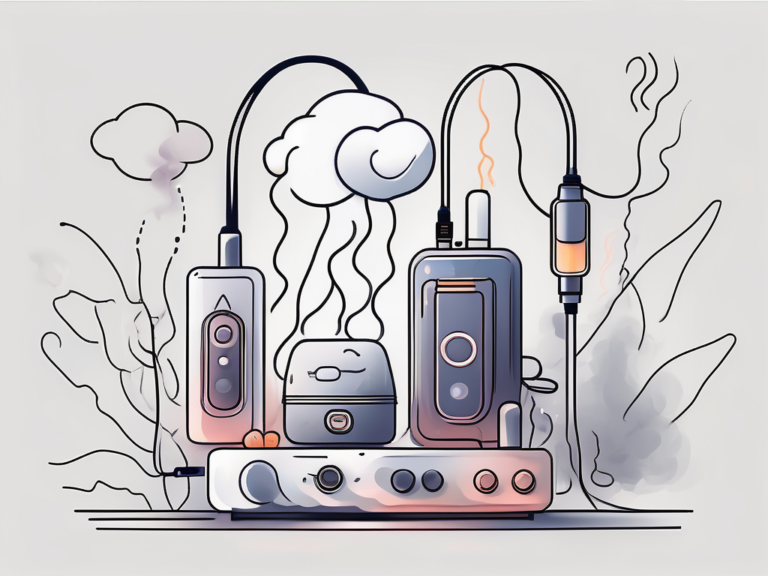why do disposable vapes make me feel sick
Disposable vapes have become increasingly popular in recent years as an alternative to traditional cigarettes. However, some people have reported feeling sick after using them. In this article, we will explore the reasons why disposable vapes may have this effect and discuss the science behind vaping-related sickness.
Understanding Disposable Vapes
What are Disposable Vapes?
Disposable vapes, also known as disposable e-cigarettes, are single-use vaping devices that come pre-filled with e-liquid. They are designed to provide a convenient and hassle-free vaping experience, as they do not require any refilling or recharging. Once the e-liquid is depleted, the entire device is disposed of.
Disposable vapes have gained popularity among vapers for their ease of use and portability. They are often used by individuals who are looking for a simple and discreet vaping option that can be easily carried in a pocket or purse. These devices are available in a wide range of flavors, catering to different taste preferences.
Key Components of Disposable Vapes
Disposable vapes consist of three main components: a battery, an atomizer, and a pre-filled e-liquid cartridge. The battery powers the device, while the atomizer heats the e-liquid, turning it into vapor that can be inhaled. The pre-filled e-liquid cartridge contains a mixture of propylene glycol, vegetable glycerin, flavorings, and, in some cases, nicotine.
The battery in disposable vapes is typically a small, non-rechargeable lithium-ion battery that is activated when the user inhales through the mouthpiece. The atomizer, also known as the heating element, is responsible for vaporizing the e-liquid. It is crucial for delivering a satisfying vaping experience by producing flavorful vapor clouds. The pre-filled e-liquid cartridge is sealed to prevent leaks and contamination, ensuring a clean and enjoyable vaping session.
The Science Behind Vaping and Sickness
The Role of Nicotine
Nicotine is a highly addictive substance found in tobacco and e-liquids. When consumed, it stimulates the release of dopamine in the brain, creating a pleasurable sensation. However, nicotine can also have negative effects on the body, including increased heart rate, elevated blood pressure, and constricted blood vessels. These reactions can contribute to feelings of sickness, especially in individuals who are sensitive to nicotine.
Furthermore, nicotine not only affects the cardiovascular system but also has an impact on the central nervous system. It can lead to changes in mood, increased alertness, and a sense of relaxation. However, prolonged exposure to nicotine can result in dependence and withdrawal symptoms when not consumed, which can further exacerbate feelings of sickness and discomfort.
The Impact of Chemicals in Vape Juice
Vape juice, or e-liquid, contains a variety of chemicals and flavorings that can cause adverse reactions in some individuals. For example, certain flavorings may contain compounds that irritate the respiratory system, leading to coughing, throat discomfort, and nausea. Moreover, the chemicals present in vape juice can vary between brands and flavors, which may affect how each individual reacts to them.
In addition to flavorings, vape juice often contains propylene glycol and vegetable glycerin, which are used as solvents to create the vapor. These substances can sometimes cause dryness in the mouth and throat, leading to a sensation of thirst and irritation. Furthermore, the heating process involved in vaping can produce byproducts such as formaldehyde and acrolein, which are known to be respiratory irritants and may contribute to feelings of sickness in some users.
Common Symptoms of Vape Sickness
Vaping has become a popular alternative to traditional smoking, but it is essential to be aware of the potential health risks associated with it. Understanding the common symptoms of vape sickness can help individuals make informed decisions about their vaping habits and overall well-being.
Short-term Symptoms
Short-term symptoms of vape sickness can include dizziness, nausea, headaches, coughing, and throat irritation. These symptoms may arise immediately after vaping or after prolonged use. It is important to note that these symptoms can vary in severity and duration among individuals.
Furthermore, some individuals may experience allergic reactions to specific ingredients in e-liquids, leading to symptoms such as skin rashes, itching, or swelling. It is crucial to pay attention to any adverse reactions and seek medical advice if necessary.
Long-term Symptoms
While limited data is available regarding the long-term effects of vaping, some studies suggest that chronic vaping may lead to respiratory issues, such as bronchitis and asthma-like symptoms. Additionally, prolonged use of nicotine-containing e-liquids can increase the risk of nicotine addiction.
Moreover, long-term vaping may also have implications for cardiovascular health, as nicotine can constrict blood vessels and increase heart rate. Research is ongoing to understand the full extent of these potential long-term effects, highlighting the importance of monitoring one’s vaping habits and seeking professional guidance when needed.
The Connection Between Vaping and Dehydration
How Vaping Can Lead to Dehydration
Vaping has been associated with dehydration due to the hygroscopic properties of propylene glycol, a common ingredient in e-liquids. Propylene glycol attracts and binds water molecules from the surrounding environment, including the lungs and mouth. This can result in dry mouth, increased thirst, and overall dehydration.
Furthermore, the act of vaping itself can lead to dehydration as individuals may inadvertently inhale less humid air compared to normal breathing. This can further exacerbate the drying effect of propylene glycol, increasing the risk of dehydration among vapers.
Dehydration and Its Effects on the Body
Dehydration can have negative effects on various bodily functions, including cognition, temperature regulation, and cardiovascular health. It is essential to stay hydrated when vaping or engaging in any activity that can contribute to fluid loss.
In addition to the physical symptoms of dehydration, such as dry mouth and fatigue, prolonged dehydration can also impact mental clarity and focus. Studies have shown that even mild dehydration can lead to cognitive impairment, affecting memory retention and decision-making abilities. Therefore, maintaining proper hydration levels is crucial not only for physical well-being but also for optimal cognitive function.
Vaping and Allergic Reactions
Common Allergens in Vape Juice
Some individuals may experience allergic reactions to specific ingredients found in vape juice. Common allergens include propylene glycol, vegetable glycerin, flavorings, and even nicotine. Allergies can manifest in different ways, ranging from mild skin irritations to more severe respiratory symptoms.
Propylene glycol, a common ingredient in vape juice, is known to cause allergic reactions in some individuals. It is a synthetic liquid substance that absorbs water and is used by the food and pharmaceutical industries. Vegetable glycerin, another key component of vape juice, can also trigger allergies in sensitive individuals. This clear, odorless liquid is derived from plant oils and is used in various cosmetic and food products.
Recognizing an Allergic Reaction to Vaping
If you suspect that you may be experiencing an allergic reaction to vaping, it is important to seek medical advice. Symptoms to watch out for include itching, hives, rash, shortness of breath, chest tightness, and swelling of the face, lips, or tongue. An allergist can perform tests to identify the specific allergen and provide appropriate recommendations.
Nicotine, a highly addictive substance present in many vape juices, can also lead to allergic reactions in some individuals. It is a stimulant that affects the central nervous system and can cause various symptoms such as increased heart rate, nausea, and headaches. Additionally, certain flavorings used in vape juice, such as cinnamon or menthol, have been reported to trigger allergic responses in some users.
In conclusion, feeling sick after using disposable vapes can be attributed to various factors, such as nicotine sensitivity, chemicals in vape juice, dehydration, and allergies. If you are experiencing any discomfort or adverse effects, it is advisable to consult with a healthcare professional. It is always important to prioritize your health and make informed decisions when it comes to vaping or any other habits that may affect your well-being.






